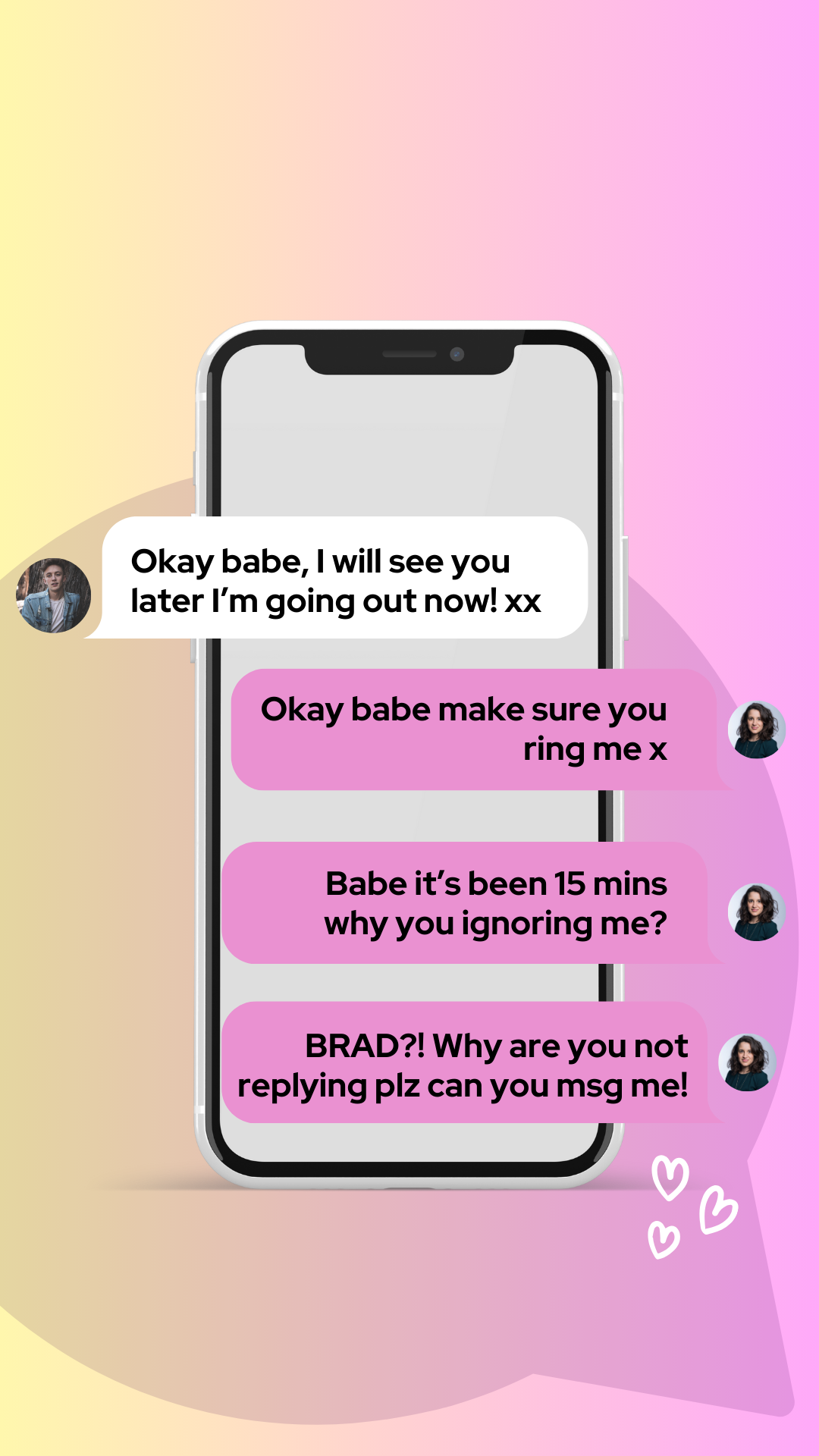Ever wondered if you’re being too clingy with your partner? We hear the crazy confessions of some clingy girlfriends, delve into why we behave this way and hear professional advice on becoming less attached.
He still hasn’t texted me back. What can he possibly be doing that’s more important? I should text him again. Why is he not answering? There are only two options. He’s either got another girlfriend or he’s been attacked.
Oh wait, he just texted me back.
Sound familiar? If yes, you could be the ‘Clingy Girlfriend’.
However, being clingy isn’t solely confined to the example above, so don’t think you’ve escaped the label if your personal experience doesn’t match up. Anyone who finds themselves overly consumed by their partner or the status of the relationship could be seen as excessively attached, dependent and obsessed, A.K.A a clingy girlfriend.
Although it is completely normal to sometimes be preoccupied with thoughts of your partner, obsessive thinking about their whereabouts, actions, safety, mood or closeness to you is unhealthy. Natalie Wilson, who is the relationship psychologist at Mega Pleasure, said: “Clinginess and obsessive behaviours are actually very common, but they have varying degrees of intensity. These behaviours might manifest as constantly needing reassurance, excessive monitoring of a partner’s activities or an overwhelming desire for constant contact.
“While initially driven by a longing for closeness, these behaviours can have detrimental effects on both the relationship and one’s mental well-being. For the individual exhibiting these behaviours, it can lead to heightened anxiety, stress and a sense of dependency.”
Being clingy can hugely chip away at your self-esteem and confidence, especially when your concerns aren’t reassured. Many women wish that these obsessions would just disappear but as we all know, it’s easier said than done. Imogen, a 21-year-old trainee psychologist from Leicester, experienced clinginess to the point where she knew her relationship had to end. “I used to act completely crazy. One time I checked if his email was registered with Only Fans and when it was, I hacked into his account and deleted it.
“I also looked through his locked photo album and found nudes of his ex, so I deleted them. He even ended up asking me about it, so he’d obviously gone to look at them. I’d also go down his following on Instagram, click on every girl and check if he’d been liking her pictures.”
Imogen found her clinginess to be so draining that she called things quits after a few months but since getting into a new relationship she realised that these behaviours weren’t just a personality trait. “My ex was so untrustworthy that it made me act this way. It first started when I found out he’d cheated on me and then I got obsessed with his every move. Now looking back I can’t believe I ever acted like this. My anxiety was sky high so I was doing clingy things to relieve it but every time I would find something else and end up maintaining the behaviours.
“It really depends on who you’re with and how much you trust them. With my new boyfriend I have nothing to worry about and he goes out of his way to make me feel secure.”
In Imogen’s case, her behaviours stemmed from trust issues and past trauma that she hadn’t been able to forget. Chris Pleines, a relationship expert from Dating Scout, explained that clinginess is often a sign that we are scared of being left alone or don’t feel great about ourselves in the relationship. “These feelings can be caused by trust issues from our past and insecurities about losing somebody we love. This often makes us crave constant validation from our partners and reassurance that we are the most important thing to them. We constantly need to know that they love and care about us.”
However, clinginess can occur without a real reason to deem your partner to be untrustworthy. Molly, a 25-year-old waitress from Birmingham, admitted she was in a healthy relationship but would use clingy behaviours to potentially start an argument with her partner. “I’d check his Instagram following on safari and see who the most recent people he’d followed were. If it was girls, I’d always have to ask him about it.
“I’d also go through his camera roll to see if there were any pictures of girls on there. I was definitely the toxic one and I just did it for attention really.”
Iris Insalaco, who is a 20-year-old marketing student, also shared that she uses clingy behaviours to get attention at times. “One time I changed my VPN to a location near his house and then went on Snapchat so he could see I was there on the Snapchat maps thing. I was really just sat at home like three hours away, but it caught his attention and he messaged me.
“I guess I just wanted to freak him out and pretend I was near him. I wanted him to think I was out having a good time because he hadn’t really been texting me or anything.”

So why are we so obsessed with having the attention of our partners? Pleines explained this is likely due to having an anxious attachment style which is rooted in early life experiences and affects how we perceive and respond to intimacy. He gave us the top five behaviours which can help identify this:
- Fear of abandonment: Needing constant reassurance and attention from your partner. If you don’t receive this, you worry that they are no longer interested in you.
- Hypersensitivity: Feel overly sensitive to your partners emotions and you interpret the smallest change as a problem in the relationship or with you.
- Need for closeness and validation: May feel worthless without affirmations from your partner which can lead to insecurities and clingy behaviours.
- Difficulty with trust and independence: Might struggle with time apart as you fear this indicates a weakened relationship and your partner may be unfaithful. Could end up overthinking your partners actions and searching for problems.
- Emotional turbulence: Experience high highs and low lows dependent on the perceived security of your relationship.
21 year old Amelia knew that her actions were due to her attachment style. “I was overreacting to a lot of things because I was so attached to my partner. My mood would be completely dependent on how he was treating me, whether he was texting me and whether we had plans. It was exhausting.
“I did some research because I actually couldn’t take it anymore and I realised I had an anxious attachment style. It’s reassuring to know you’re not just crazy, but it has taken a lot of work to calm myself down.
“It’s also something your partner has to be considerate of. Mine wasn’t the type to offer reassurance, stay in contact daily or make plans in advance, purely because he’s just very laid back, but this had so much influence on whether my anxiety was activated or not.”
Pleines explained that this attachment style can come from a lot of things in your childhood, including separated parents, neglect, abuse or chaotic behaviour that was scary to be around. However, it can also be purely down to genetics.
With all these things contributing to being a clingy girlfriend, it might seem like something that’s impossible to change. Recognising the problem is a huge step in the right direction, not only for your relationship but also for your own sanity. Sex and relationships expert, Charlotte Johnson, explained that improvement involves open communication and a supportive environment. “Both partners need to express their needs and maintaining individual space whilst reassuring each other is key. This could be through a text message, phone call or an act of kindness, like them asking how your day was or surprising you with your favourite food. Just little things that let you know that they are thinking of you is enough. You should think about what would make you feel less anxious and voice it.
“Seeking therapy or counselling also offers a deeper understanding and can help with coping mechanisms during stressful times. Building self-confidence and fostering independence outside of the relationship is so important too. Make sure you have your own hobbies, friendships and goals since personal growth is crucial for reducing clinginess.”
Pleines also emphasised the importance of respecting boundaries and creating your own to manage dependency on your partner. He advised that this will help remain individuality and a sense of personal space. He recommended reminding yourself that a healthy relationship is based off trust and respect, not constant monitoring.
So next time you find yourself stressing about an unanswered text, distance from your partner or a newfound bluntness in their communication, take a step back and evaluate why you’re feeling anxious. Don’t be afraid to communicate your concerns, since your partner unfortunately can’t read your mind. It’s important to remember that everyone is entitled to their own personal space, including yourself, and you each have a life outside of the relationship. Distract yourself with a new hobby, meet your friends or simply turn off your phone and turn on your favourite show. It will take some work, but you are certainly not alone.
Expert insight: Natalie Wilson
Natalie is a psychologist who specialises in sex and relationships. At the time this interview was conducted, she worked for Mega Pleasure, but has recently become more focussed on marriage and family therapy.
Expert insight: Chris Pleins
Chris is a relationship psychologist and expert. He currently works for the company Dating Scout, which reviews dating apps and provides relationship advice.




